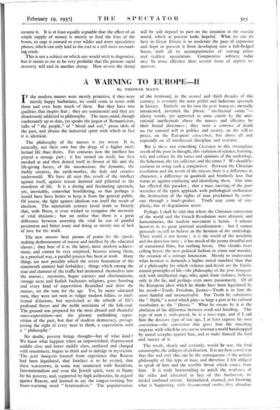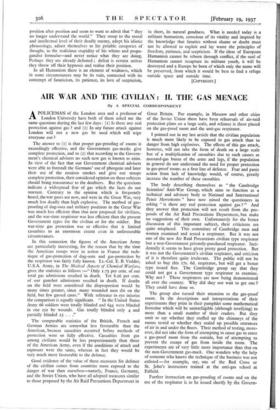A WARNING TO EUROPE II
By THOMAS MANN
I F the modern masses were merely primitive, if they were merely happy barbarians, we could come to terms with them and even hope much of them. But they have two qualities that inspire fear ; they are sentimental and they are disastrously addicted to philosophy. The mass-mind, though exuberantly up to date, yet speaks the jargon of Romanticism, talks of "the people," of "blood and soil," pious idols of the past, and abuses the industrial spirit with which in fact it is identical.
The philosophy of the masses is yet worse. It is, naturally, not their own but the dregs of a higher intel- lectual life than theirs. For centuries now the intellect has played a strange part ; it has turned on itself, has first mocked at and then denied itself in favour of life and the life-giving forces, of the unconscious, the dynamic, the darkly creative, the earth-mother, the holy and creative underworld. We have all seen this revolt of the intellect against itself, against reason damned and pilloried as the murderer of life. It is a daring and fascinating spectacle, yet, inevitably, somewhat bewildering, so that perhaps it would have been better to keep it from the general public. Of course, the fight against idealism was itself the result of idealism. The nineteenth century loved truth so bitterly • that; with Ibsen, it even wished to recognise the necessity of vital illusions ; but we realise that there is a great • difference between asserting the vital lie out of painful pessimism and bitter irony and doing so merely out of lack of love for the truth.
The new masses hear paeans of praise for the epoch- . making dethronement of reason and intellect by the educated classes ; they hear of it as the latest, most modern achieve- ment, and cannot be very surprised, because among them, • in a practical way, a parallel process has been at work. Many things are now possible which the severe humanism of the ,nineteenth century had forbidden ; things which among the roar and clamour of the traffic had insinuated themselves into the masses; mysteries, bogus sciences and charlatanisms, strange sects and foolish backstairs religions, gross humbug and every kind of superstition flourished and drew the masses, set the tone for the age. Yet, by many educated men, they were not seen as vulgar modern follies, or intel- lectual delusions, but mysticised as the rebirth of life's profound forces and the noble intuitions of the folk-soul. The ground was prepared for the most absurd and Shameful mass-superstition—not the gloomy unthinking super- stition of the past, but that of modern democracy, presup- posing the right of every man to think, a superstition with a "philosophy."
No doubt, poverty brings thought—but of what kind ? We know what happens when an impoverished, dispossessed middle class and lower middle class, confused and charged with resentment, begins to think and to indulge in mysticism. The petit bourgeois learned from experience that Reason had been liquidated, that Intellect is to be reviled, that these scarecrows, in some way connected with Socialism, Internationalism and even the Jewish spirit, were to blame for his poverty, and, supported by high authorities, he argued against Reason, and learned to say the tongue-twisting but heart-warming word "Irrationalism." The popularisation of the irrational, in the second and _third decades of this century, is certainly the most pitiful and ludicrous spectacle in history. Entirely on his own the petit bourgeois, mentally intoxicated, invented the phrase "intellectual swine "- idiotic words, yet approved to some extent by the anti- rational intellectuals above the masses and effective by their brutal directness ; they were a sentence of death on the rational will in politics and society, on the will to peace, on the European conscience, but above all and especially on all intellectual discipline and restraint.
But is there not something Christian in this triumphant revolt of the poor in thought, this violation of science, learning, wit, and culture by the tastes and opinions of the underdogs, the fisherman, the tax-collector, and the sinner? We should be cautious in using such a comparison. Between the Christian -revolution and the revolt of the masses there is a difference in character, a difference in goodwill and brotherly love that warns us against confusing and identifying them. Our time has effected this paradox ; that a mass meeting of the poor wretches of the spirit applauds with pathological enthusiasm the destruction of the rights of man proclaimed by some- one through a loud-speaker. Truth may come of sim- plicity, but of degradation never.
Perhaps I shall be told that where the Christian conversion of the world and the French Revolution were altruistic and humanitarian, the modern movement is heroic. I admire heroism in its great spiritual manifestations : but I cannot persuade myself to believe in the heroism of the underdogs. Their world is not heroic ; it is the world of the novelette and the detective story ; it has much of the penny dreadful and of sensational films, but nothing heroic. One shrinks from calling heroic the new political fashion in crime and murder, the creation of a corrupt fanaticism. Merely to understand what heroism is demands a higher moral standard than that of a philosophy for which violence and deceit are the funda- mental principles of life—the philosophy of the petit bourgeois sick with intellectual rage, who, apart from violence, believes only in the lie, and perhaps even more passionately. Of all the European ideas which he thinks have been liquidated by his revolt—Truth, Freedom, Justice—Truth is to him the most hateful and inconceivable. For Truth he substitutes the " Myth," a word which plays as large a part in his cultural vocabulary as the "Heroic." What he means by it is the abolition of the difference between truth and humbug. This type of man is widespread, he is 'a mass-type, and if I call him the decisive type of our age, I at least express his own conviction—the conviction that gives him the smashing impetus with which he sets out to overrun a world handicapped by moral scruples against him, and to make himself the lord and master of it.
The result, clearly and certainly, would be war, the final catastrophe, the collapse of civilisation. It is my firm convict ion that this and only this can be the consequence f the activist philosophy of this type of man, and therefore I felt obliged to speak of him and the terrible threat which comes from him. It is truly heartrending to watch the weakness of the older and educated in face of this barbarism, its misled confused retreat. Intimidated, stunned, not knowing what is happening, with disconcerted smiles, they abandon position after position and seem to want to admit that "they no longer understand the world." They stoop to the moral and intellectual level of their deadly enemy, adopt his idiotic phraseology, adjust themselves to his pitiable categories of thought, to the malicious stupidity of his whims and propa- gandist formulae—and never notice what they are doing. Perhaps they are already defeated ; defeat is certain unless they throw off their hypnosis and realise their position.
In all Humanism there is an element of weakness, which in some circumstances may be its ruin, connected with its contempt of fanaticism, its patience, its love of scepticism, in short, its natural goodness. What is needed today is a militant humanism, conscious of its vitality and inspired by the knowledge that fanatics without shame or doubt must not be allowed to exploit and lay waste the principles of freedom, patience, and scepticism. If the ideas of European Humanism cannot be reborn through conflict, if the soul of Humanism cannot recapture its militant youth, it will be destroyed and a Europe be born of which only the name will be preserved, from which it would be best to find a refuge outside space and outside time.
[COPYRIGHT.]















































 Previous page
Previous page